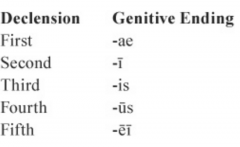![]()
![]()
![]()
Use LEFT and RIGHT arrow keys to navigate between flashcards;
Use UP and DOWN arrow keys to flip the card;
H to show hint;
A reads text to speech;
37 Cards in this Set
- Front
- Back
|
Latin verbs have 5 characteristics what are the? |
Person, number, tense, mood and voice |
|
|
How many forms can an english verb have at most? |
5 (e.g 2 present tense, e.g 'drink' & 'drinks', 1 past tense 'drank' and 2 participles 'drinking', 'drunk') |
|
|
Is Latin and Analytical or an Inflected language? |
Inflected (Inflected languages rely on word endings, analytical ones rely on word order) |
|
|
What is a dipthong? |
A pair of vowels spoken like one vowel |
|
|
What is the English equivalent of the letter 'X' in Latin? |
X in Latin is a double consonant which stands for either 'c +s' or 'g + s' |
|
|
True or false, in Latin the letter 'V' is pronounced like an english 'W' |
True |
|
|
True or false: The letter 'Q' in latin is always followed by 'S' |
False, it is always followed by 'U' |
|
|
What does a conjunction do? |
Connects words, phrases or clauses |
|
|
In Grammar what is the word used to show a relationship between words called? |
A Preposition |
|
|
What is an interjection? |
an exclamation word, e.g 'yeah!', 'uh-oh' |
|
|
Describe what a noun is |
A Person, place of thing (e.g 'men', 'Rome', 'bagpipe') |
|
|
What is a verb? |
A doing word or a word that shows action or existence (e.g 'drink', 'was', 'happen') |
|
|
What is an adverb? |
adverbs modify verbs(add + verb), e.g 'yesterday', 'quickly', 'often' |
|
|
what is an adjective? |
adjectives describe nouns (e.g 'green', 'tall', 'seventeenth') |
|
|
What are the three stresses or 'Accents' placed upon words in latin called? |
'Ultima' (end) 'Penult' (before the end) 'antepenult (third from the end) |
|
|
True or false: Latin word order is subject-Object-Verb |
True |
|
|
True or false: Latin word order is Object-Subject-Verb |
False, the word order is Subject-Object-Verb |
|
|
What are the 7 Grammatical cases of Latin Noun declensions? |
nominative, vocative, accusative, genitive, dative, ablative and locative |
|
|
What is the basic function of the Nominative case? |
The subject of Action (e.g 'HE walked the dog') |
|
|
What is the basic function of the Genitive case? |
Linking Nouns (e.g 'HIS idea was ridiculous') |
|
|
What is the Basic function of the Dative Case? |
Personal Interest (e.g 'It was an interesting day FOR HIM') |
|
|
What is the Basic function of the Accusative Case? |
Where action stops (e.g 'I smacked HIM') |
|
|
What is the basic function of the Ablative Case? |
Where action starts (e.g 'This bookcase was built BY HIM') |
|
|
What is the basic function of the Instrumental Case? |
Goes alongside action (e.g 'We went to Rome WITH HIM')
|
|
|
What is the basic function of the Locative case? |
Where action takes place (e.g 'A bug was crawling ON HIM') |
|
|
What is the basic function of the Vocative case? |
Person addressed (e.g 'dude!') |
|
|
What does the grammatical term 'number' refer to? |
Singular or Plural |
|
|
What does the grammatical term 'gender' refer to? |
Masculine, feminine or neuter |
|
|
True or False: Grammatical gender is an attempt by the patriarchy to make women feel weak |
False: Grammatical Gender is assigned to objects based on the class of endings they take. For example Mensa(table) is considered grammatically feminine because it follows the same pattern of endings as Puella(girl) |
|
|
True or false: The neuter gender gets its name from the Latin shemales of the time |
False. The neuter gender gets its name from the latin neuter, which means 'neither'. |
|
|
Latin dictionary entries for nouns are divided into four parts what are the first two? |
1st part - Nominative singular form 2nd part - Genitive singular form |
|
|
What are the genitive endings of all five declensions? |

|
|
|
How is the stem discovered in a Latin Noun? |
The genitive ending is removed in the second principle part. |
|
|
What are the four principle parts of latin verbs? |
- The first principal part is the present active 1st person singular form
- |
|
|
In Latin grammar what are the four 'moods' called? |
- indicative ( fact) 'he is here' - imperative (command) 'be here!' - subjunctive (wish) 'if he were here' - infinitive (general) 'to be' |
|
|
In Latin grammar what are the three 'voices' and what do they represent? |
- active voice (subject performing action) 'he loves me' - passive voice (subject receiving action) 'I am loved' - middle voice (action performed on self) 'I love myself' |
|
|
A Latin verb may have four participles what are they? |
- present active (buying) - perfect passive (bought) - future active (about to buy) - future passive (about to be bought) |

